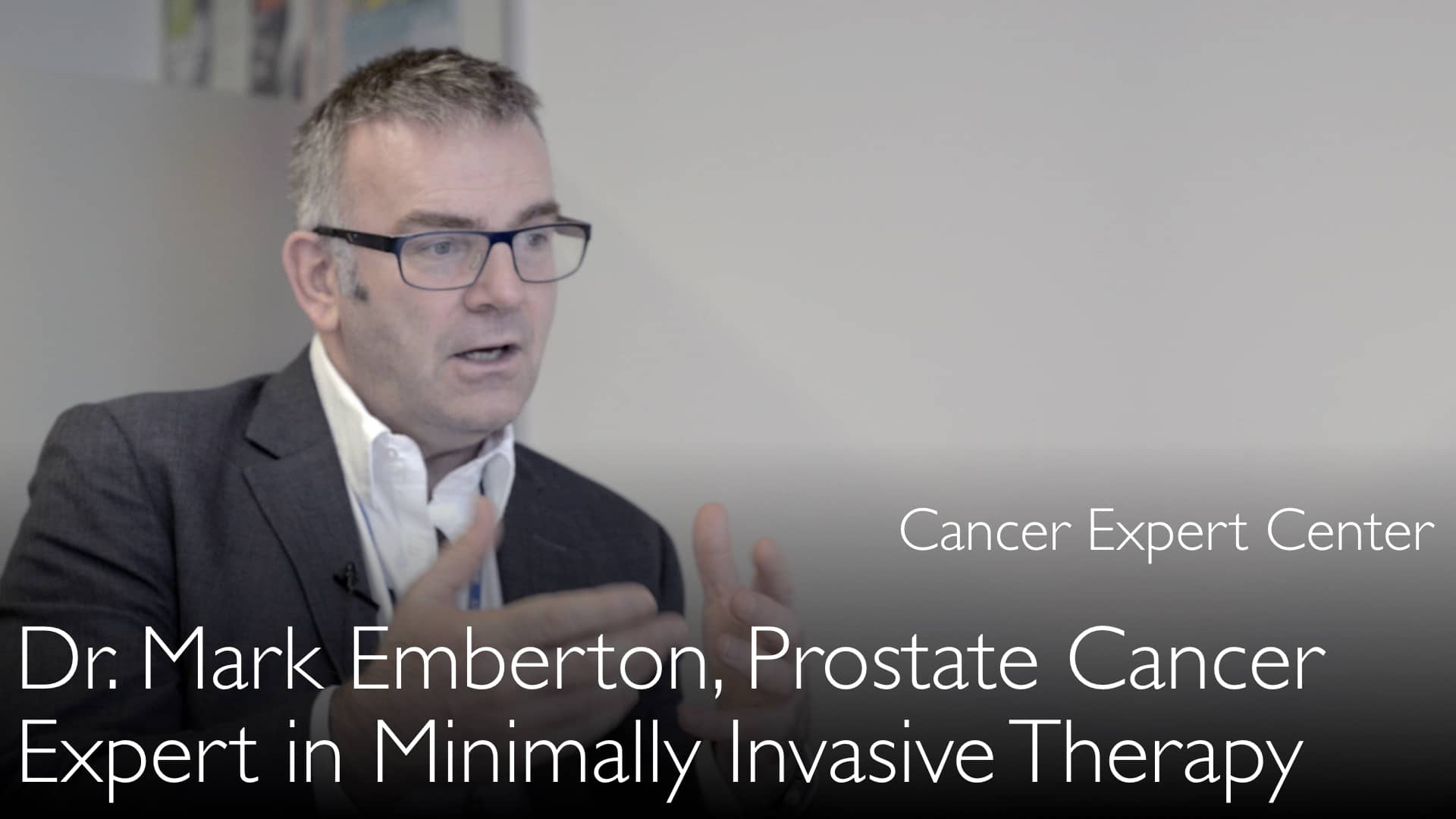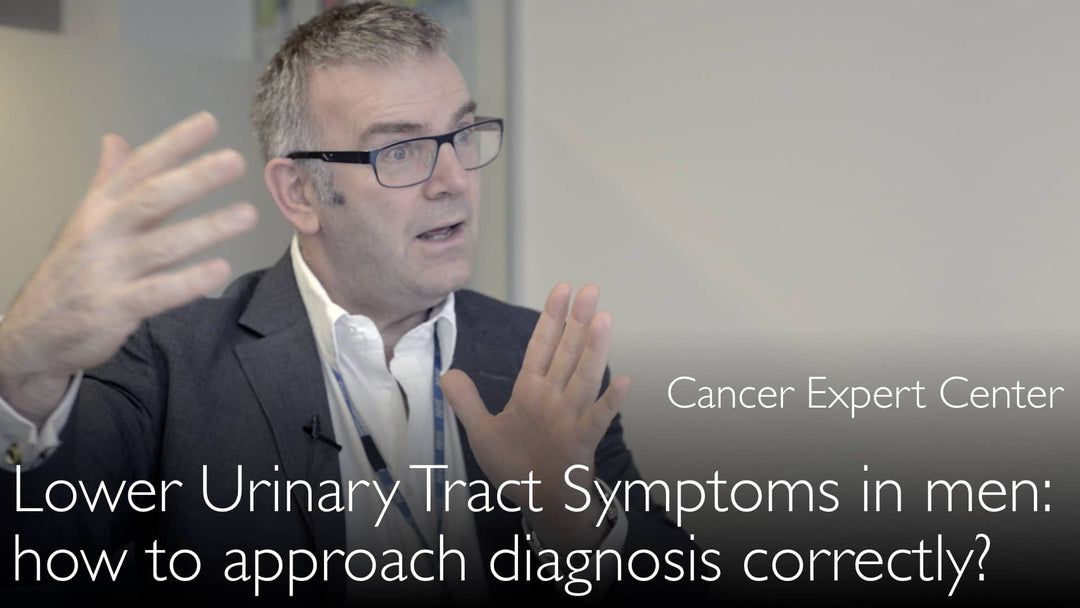O principal especialista em câncer de próstata, Dr. Mark Emberton, MD, detalha as diferenças cruciais nos efeitos colaterais entre cirurgia e radioterapia, abordando incontinência, disfunção sexual e complicações intestinais. Ele também discute como a ausência de dados comparativos conclusivos faz com que a escolha do paciente dependa fortemente de suas prioridades pessoais e de questões logísticas práticas.
Tratamento do Câncer de Próstata: Comparação dos Efeitos Colaterais entre Cirurgia e Radioterapia
Navegar para a Seção
- Visão Geral das Opções de Tratamento
- Falta de Dados Comparativos
- Efeitos Colaterais da Cirurgia
- Efeitos Colaterais da Radioterapia
- Prioridades e Logística do Paciente
- Fatores Emocionais na Escolha
- Dados Futuros: Estudo PROTECT
Visão Geral das Opções de Tratamento
O tratamento do câncer de próstata envolve principalmente a escolha entre prostatectomia radical (cirurgia) e diferentes modalidades de radioterapia. Segundo o Dr. Mark Emberton, essa decisão é complexa e pode ser comparada ao dilema entre cirurgia e radioterapia em outras condições, como o neuroma do acústico. Ambas as abordagens visam curar o câncer de próstata localizado, mas impactam de forma distinta a qualidade de vida do paciente.
Falta de Dados Comparativos
Um dos principais desafios para pacientes e médicos é a escassez de dados robustos de ensaios clínicos comparativos. O Dr. Mark Emberton ressalta que, até o momento, nenhum estudo comparou diretamente cirurgia, radioterapia e vigilância ativa com desfechos de longo prazo. A suposição atual na comunidade médica é que esses tratamentos têm eficácia semelhante no controle da doença, mas isso ainda não foi comprovado por evidências de alta qualidade.
Efeitos Colaterais da Cirurgia
A cirurgia para câncer de próstata é um procedimento de grande porte e representa um evento significativo na vida do paciente. O efeito colateral mais marcante da prostatectomia radical é a incontinência urinária. Conforme explica o Dr. Mark Emberton, essa é uma grande preocupação para muitos homens que consideram essa opção. Tanto a cirurgia quanto a radioterapia podem causar disfunção erétil e outros problemas sexuais, mas o risco de complicações urinárias é consideravelmente maior com a intervenção cirúrgica.
Efeitos Colaterais da Radioterapia
A radioterapia para câncer de próstata apresenta seus próprios desafios e efeitos colaterais. Um aspecto prático importante é a frequência do tratamento, que geralmente exige deslocamentos ao hospital por cerca de 35 dias, ao longo de 6 a 7 semanas. Embora a incontinência não seja comum com a radiação, há uma maior tendência de afetar a função retal. O Dr. Emberton esclarece que isso se deve a danos na mucosa retal provocados pela radiação, o que pode resultar em disfunção intestinal.
Prioridades e Logística do Paciente
A escolha do tratamento para câncer de próstata frequentemente é influenciada por questões práticas, além dos aspectos clínicos. O Dr. Mark Emberton destaca que a proximidade do paciente com um hospital que oferece radioterapia é um fator crucial, especialmente para quem mora longe. Além disso, os pacientes devem avaliar pessoalmente quais efeitos colaterais potenciais—incontinência, disfunção sexual ou problemas intestinais—estão mais dispostos a enfrentar. Existem ferramentas de apoio à decisão disponíveis para ajudar nessa ponderação.
Fatores Emocionais na Escolha
O Dr. Anton Titov e o Dr. Mark Emberton discutem como a escolha do tratamento é muitas vezes guiada por fatores emocionais não racionais. Alguns pacientes têm um medo inerente da radiação, talvez devido a experiências negativas de conhecidos. Outros temem a anestesia geral ou o próprio conceito de cirurgia. O Dr. Emberton observa que compreender esses receios é uma parte essencial do processo de consulta.
Dados Futuros: Estudo PROTECT
Respostas mais definitivas estão a caminho. O Dr. Mark Emberton destaca os resultados futuros do ensaio clínico PROTECT, realizado no Reino Unido. Esse estudo foi desenhado para fornecer dados de alta qualidade sobre sobrevida específica por câncer de próstata, sobrevida global e os efeitos colaterais de longo prazo da cirurgia, radioterapia e vigilância ativa. Essas evidências serão fundamentais para auxiliar futuros pacientes a fazer uma escolha verdadeiramente informada.
Transcrição Completa
Dr. Anton Titov, MD: A cirurgia e a radioterapia para câncer de próstata afetam a função urinária e sexual de maneiras diferentes. Como escolher o método de tratamento correto? Essa pode ser uma questão complexa. A comparação entre cirurgia e radioterapia é um desafio semelhante ao do tratamento do neuroma do acústico em neurocirurgia. É muito difícil avaliar os benefícios de cada abordagem.
Dr. Mark Emberton, MD: Sim. Até agora, não há um ensaio clínico que compare diretamente cirurgia, radioterapia e vigilância ativa. Em breve, teremos um estudo no domínio público—o PROTECT, realizado no Reino Unido, do qual não participo diretamente.
Esse estudo trará resultados sobre sobrevida específica por câncer de próstata, sobrevida global e os efeitos colaterais de cada intervenção ao longo do tempo. Assim, teremos dados para ajudar os homens a escolher entre as opções de tratamento.
Atualmente, a suposição é que todas as terapias têm eficácia similar, mas não há evidências sólidas que comprovem isso. No entanto, os perfis de efeitos colaterais são bastante distintos.
Para a radioterapia, é necessário comparecer ao hospital por cerca de 35 dias—o que equivale a 6 ou 7 semanas. Se o paciente mora longe do hospital, isso representa um grande transtorno. Já a cirurgia é um procedimento de grande porte, muito controlado, mas ainda assim um evento impactante.
Algumas pessoas têm uma predisposição emocional forte a favor ou contra a radioterapia ou a cirurgia. Recentemente, atendi pacientes que não queriam nenhum dos dois. Sempre busco entender as razões por trás dessa relutância.
Dr. Anton Titov, MD: E muitas vezes é um sentimento não racional. Alguns temem a radiação porque conhecem alguém que teve uma experiência negativa. Outros têm medo da anestesia e da cirurgia.
Dr. Mark Emberton, MD: Muito disso se deve a razões que não compreendemos totalmente. Outra parte é a priorização dos efeitos colaterais. A incontinência é a grande preocupação com a cirurgia, mas não é comum com a radioterapia.
Ambos os tratamentos podem afetar a função sexual. A radioterapia tende a impactar mais o reto, devido aos danos à mucosa causados pela radiação. Os pacientes precisam considerar isso.
Há várias ferramentas de apoio à decisão disponíveis publicamente, que ajudam os pacientes a refletir sobre como se sentiriam após cada tratamento. No final, porém, o fator que mais influencia a escolha costuma ser o primeiro especialista que o paciente consulta.
Dr. Anton Titov, MD: Ou seja, se ele vê primeiro um cirurgião ou um radioterapeuta. É isso que os dados sugerem.
Dr. Mark Emberton, MD: Sim, e a escolha também é guiada por questões práticas, como a proximidade com o hospital, e pelo perfil de efeitos colaterais que o paciente está disposto a aceitar.








